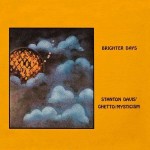For a teenaged New Orleans trumpeter in 1967, a ticket to Berklee College of Music in Boston was an irresistible draw. After finishing college, Walter Cohen High School grad Stanton Davis stayed in Boston and put together the Ghetto Mysticism Band with some of the heaviest jazz players in the city. In 1977, Davis and the band released their lone album, Brighter Days. For years it was lost in crate-digger purgatory until its CD re-release earlier this year (a vinyl reissue is planned for July).
No one can accuse Brighter Days of limping out the gate, with the cackling laughter and slippery bass line of opener “Things Cannot Stop Forever” giving way to pounding drums and mood-setting synth washes behind Davis’ jubilant trumpet. It’s jazz, it’s funky, and its ’70s time stamp would probably classify it as “fusion,” with obvious references to Headhunters-era Herbie Hancock and electric Miles Davis. On “Play Sleep,” Davis and Ghetto Mysticism run the voodoo down with a dark bass line anchoring beautiful piano runs and wailing trumpet before moving into the bright-eyed, hopeful haze of “Brighter Days/Brighter Daze.”
The standout is “Funky Fried Töfu,” with a silly-but-catchy chorus that Davis says was semi-autobiographical, rooted in his New Orleans heritage and its melding with the northern, high-minded sensibilities he had taken on. It’s an exploratory piece, both danceable and contemplative. The rhythm bubbles in hot oil, the melodies crisp and golden.
The ballads rest their heads on the stronger, quick-tempoed songs nearby, but the individual differences between them largely melt away, and all nine tracks coalesce into a spacy, groove-heavy whole. Unconsciously, Brighter Days found its way to the same rhythmic, post-jazz galaxy as so many younger jazz-funk bands today, and if the fans of those groups find this, they’ll find a lot to like. As a stately voice announces on “High Jazz Reprise,” “Jazz is dead, long live jazz!”





